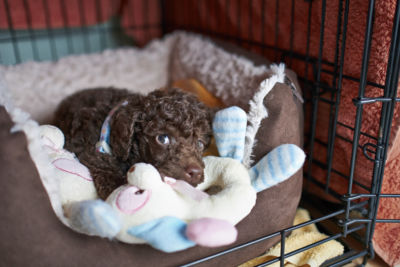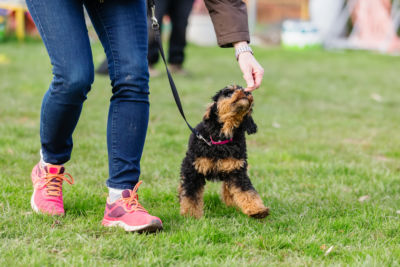
Congratulations on your new little family member! You have a memorable few months of joy and excitement ahead of you, as well as some disrupted sleep.
As a new puppy owner, you’ll find getting up in the middle of the night is inevitable for the first weeks as your furry friend gets used to its new home. You may wonder how to get a puppy to sleep to stop your sleep deprivation and get those restful nights to come back.
Puppies often have difficulty adjusting to their new surroundings and can be restless at night. In this blog post, we will provide you with some tips on how to help your puppy sleep through the night. We will cover everything from establishing a bedtime routine to using calming essential oils. Follow our tips and your puppy will be sleeping through the night in no time!
How to Get a Puppy to Sleep
The good news is that all new pup owners go through this, and the teaching now makes other areas of development, like house training, much easier.
Puppies are such restless little sleepers at this early stage for four main reasons:
- Separation anxiety
- Bathroom breaks
- Wanting playtime
They’ve gone from snuggling up to warm, furry littermates to suddenly being alone. They wake up those first nights and seek reassurance that they’re safe. At this age, their small bladders can only last a few hours before they need to be emptied. Lastly, they’re puppies — they’re high-energy and often wake up urgently needing to play and, well, just be puppies.
Crate Train
Lots of new puppy parents don’t like the idea of crate training. They can seem imposing, but crates are by far the best way to encourage restful puppy sleep. Put them in and close the door when you go to bed. Provide masses of comfy, soft blankets your pup can snuggle into. The idea behind a puppy’s crate or a dog bed is to create an association with a safe, quiet place.
For some, putting the dog crate in the same room as you’re in brings down their anxiety to a level that causes them to stop whining sooner. However, in most cases, putting the crate as far away from your bedroom or living area as possible yields the best results (or at least, makes it more manageable for your family during the process). The location of the crate is a trial and error situation. If your puppy hasn’t settled down after a few nights, try moving the crate to a new area. It may also help to play music or turn on a white noise machine.
Night Potty Break
 A puppy isn’t able to hold its bladder very long. On average, it can last for as many hours as it is months old. For example, a 2-month-old can hold it for about two hours. Aim to take them out for a potty break right before bedtime. If they’re not “showing the signs,” still take them out for a little jaunt to encourage it.
A puppy isn’t able to hold its bladder very long. On average, it can last for as many hours as it is months old. For example, a 2-month-old can hold it for about two hours. Aim to take them out for a potty break right before bedtime. If they’re not “showing the signs,” still take them out for a little jaunt to encourage it.
This early potty training accomplishes two goals by teaching getting ready for bed and house training at the same time.
Tired Puppy = Sleepy Puppy
Just as with human beings, the puppy sleeps better after being exhausted. Long walks, prolonged activities, dog sports, and physical stimulation may help your puppy lose some energy and get the puppy enough sleep to get a good night’s sleep. If possible, you want your pet to be active during the day (other than taking long naps).
Also, be sure to have plenty of playtime during the evening and, importantly, before bed. Spend 20 minutes or so playing with toys, having chase games, and just general fun and frolicking.
Not only will this burn off that abundant energy, but it’ll also help get its body’s waste process moving before bedtime.
Soothing scents for your puppy
 The use of dog easing peptides (DAPs) in the intestine helps your puppy feel secure, mimicking the pheromone that the mother dog releases during pregnancy. Pheromones can be helpful for most puppy owners, but they aren’t always the best. It’s a little more complicated, and can be done with a dog. This diffuser covers huge spaces that lasts for 3-4 days and requires hardly any recharges. Another way to help your puppy sleep through the night is to use calming essential oils. We recommend lavender oil, which has a soothing scent that can help relax your puppy. Add a few drops of lavender oil to your dog’s bed or blanket, and they will be transported into dreamland in no time!
The use of dog easing peptides (DAPs) in the intestine helps your puppy feel secure, mimicking the pheromone that the mother dog releases during pregnancy. Pheromones can be helpful for most puppy owners, but they aren’t always the best. It’s a little more complicated, and can be done with a dog. This diffuser covers huge spaces that lasts for 3-4 days and requires hardly any recharges. Another way to help your puppy sleep through the night is to use calming essential oils. We recommend lavender oil, which has a soothing scent that can help relax your puppy. Add a few drops of lavender oil to your dog’s bed or blanket, and they will be transported into dreamland in no time!
Play soothing sounds
The mellow sound will calm the dogs down and mask any noise which may wake up their body. A typical go-to for soothing music for pets is classical but if this sounds too good for your puppy, try softer rock. Learn how music calms your dog. If music distracts your dog, turn on a fan for white noises or turn on a sound device.
Resisting the Temptation
Young puppies learn very fast that the best way for hours of fun during the night is to get you to respond to their little cries for attention.
When you hear those characteristic whimpers and get up, stay quiet and calm. As tempting as it may be, don’t engage in any play or cuddling.

Have Faith!
It’s common for first-time dog owners to feel a bit overwhelmed at this stage of growth. Puppy needs can seem to differ significantly from yours, and hours of sleep seem to figure low on their agenda. But remember, it’s a new environment for you both and learning how to get a puppy to sleep may take a little time.
Most puppies will be napping through the night by the time they’re around five months old with good discipline and scheduling. If your dog doesn’t get there by then, don’t worry. This is all perfectly natural, and a good night’s sleep will come in due time. Our training program is designed to help you bypass the difficult work of getting puppies crate and potty trained. Contact us now! for more details
